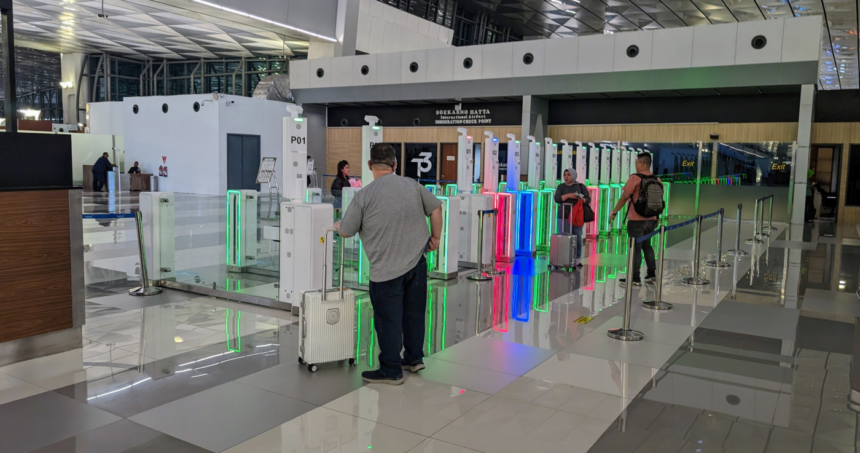After a formal complaint by the Chinese Embassy in Jakarta, Indonesia, documenting the extortion of at least 44 Chinese citizens by airport immigration officials, the Directorate General of Immigration of the Ministry of Immigration dismissed a large number of officers and compensated victims.

The travelers were pressured by immigration officers to pay them money, but at least 44 of them reported the case to the Chinese Embassy, which sprung into action and filed a complaint note.
That corruption runs rampant in the country is nothing new and we’ve reported about it ad nauseam over the years, including my very own dispute with Bali immigration officials (which didn’t involve any bribery request).
Gary reported about this yesterday as well on his View from the Wing!
According to media reports such as from the South China Morning Post, several dozen officers were “dismissed”.
Indonesia has removed dozens of immigration officers and launched an internal investigation after a leaked diplomatic letter from the Chinese embassy exposed allegations of systemic extortion at Jakarta’s main airport and reignited concerns over corruption in law enforcement.The letter, dated January 21, appears to have been sent to Indonesia’s Ministry of Foreign Affairs and details how the embassy has “solved at least 44 cases of extortion” by immigration officials against Chinese nationals who arrived at Jakarta’s Soekarno-Hatta airport between February of last year and January.
It says more than 32 million rupiah (US$1,950) in extortion money has been returned to more than 60 Chinese nationals.
“It is just a tip of the iceberg since many more Chinese nationals who were extorted did not file complaints due to tight schedules or fear of reprisals upon future entries,” the letter reads. …
So 44 individuals filed complaints with the Embassy, but ~ 32,000,000 IDR were returned to approximately 60 victims? That amounts to roughly 500,000 IDR per victim, which is awfully close to the Visa on Arrival fee.
What exactly was the scam or extortion here? Did they charge them double for a visa fee and offer a “fast track” through immigration, which was common practice in Bali as well until, at some point, this got shut down? Another possibility is that there could have been a situation at the customs check where baggage is searched.
This is the leaked letter from the Chinese Embassy to the Ministry of Foreign Affairs in Jakarta (floats around online all over the place by now):

Diplomatic cordial phrasing aside, it’s obvious that the diplomats aren’t pleased and China flexed its muscle telling the Indonesians that they expect something has to be done.
It’s obvious that the higher-ups at immigration at CGK know exactly what’s going on because in these systems bribes always have to be kicked up the chain of command. Everyone gets paid from the smallest tout over the involved officers to the commanders and Generals. That’s just how it works in this part of the world (Southeast Asia).
Clearly, the Ministry of Foreign Affairs and the immigration department needed scalps to present, which led to these “few dozen officers” being officially dismissed. They’ll probably be recycled through the law enforcement system and given roles in other areas away from the airport.
The officials aren’t sorry about the situation, they’re just sorry that they got caught with their hands in the honey pot which (once again) embarrassed the airport authorities and also damages the reputation of both Indonesia and the tourism sector.
Reputable companies and offices have signs posted that alert people not to engage in any bribery, such as this one:

There are actually many laws on the books in Indonesia that prohibit this kind of bribery:
- Law of the Republic of Indonesia No. 28 of 1999 on the Implementation of a Clean and Free State from Corruption, Collusion, and Nepotism;
- Law of the Republic of Indonesia No. 8 of 2010 on the Prevention and Eradication of Money Laundering Crimes;
- Letter of the Ministry of SOE Number: S-17/S.MBU/02/2020 on February 17, 2020 mentions all SOEs must perform ISO 37001 Anti-Bribery Management System;
- Joint Decision between the Board of Directors and the Board of Commissioners of PT Pembangkitan Jawa-Bali Number: 002. K/021/DIR/2020 and Number: 003. K/DK-PJB/2020 on Anti Fraud Policy in the Environment of PT Pembangkitan Jawa-Bali
Of course, the letter of the law and reality are more often than not totally different. Bribery is common, daily practice in countries like Indonesia, Thailand, Malaysia and the Philippines. Until it triggers a public scandal, and then those involved go into damage control mode.
Involving foreigners in an ongoing extortion scheme, especially at the airport, is bound to draw attention from the respective diplomatic missions at some point because, eventually, people will lodge complaints.
No embassy wants to have dozens of complaints about local officials being corrupt and their visiting citizens being extorted, they have better things to do.
The Chinese Embassy and their Charge d’affairs have to be commended for kicking this up the chain and stopping it after way too much damage was already done. I see in the letter that they also demand that signage be installed and that a proper oversight (a** kicking) within the force will stop it.
Conclusion
A bribery and extortion scandal at Jakarta’s main Soekarno-Hatta airport has caused quite a bit of stir and led to the dismissal of several dozen corrupt officers. Affected victims also received a refund of the funds they were scammed out of.
Chinese people (who were the ones primarily profiled here) do have a tendency to file complaints, and if something like this hits media channels, it spreads like wildfire. Same with the abductions of Chinese nationals in Thailand these past few weeks. Huge numbers of Chinese tourists canceled their trips during CNY as they tend to be very risk-adverse travelers.
Over the years, we have seen many such airport scams; the most prolific one that caused an uproar was probably the bullet scam at Manila Airport, where corrupt officers would place ammunition into a passenger’s baggage and then extort the person for cash. Eventually, the President (Duterte at the time) shut that down and issued direct threats to the officers involved.





